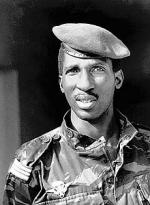Disable ads!
Thomas Sankara
Thomas Isidore Noël Sankara (December 21, 1949 – October 15, 1987) was a Burkinabé military captain, Marxist revolutionary, pan-Africanist theorist, and President of Burkina Faso from 1983 to 1987. Sankara seized power in a 1983 popularly supported coup at the age of 33, with the goal of eliminating corruption and the dominance of the former French colonial power. He immediately launched one of the most ambitious programmes for social and economic change ever attempted on the African continent. To symbolize this new autonomy and rebirth, he even renamed the country from the French colonial Upper Volta to Burkina Faso ("Land of Upright Man"). His foreign policies were centered on anti-imperialism, with his government eschewing all foreign aid, pushing for odious debt reduction, nationalizing all land and mineral wealth, and averting the power and influence of the International Monetary Fund (IMF) and World Bank. His domestic policies were focused on preventing famine with agrarian self-sufficiency and land reform, prioritizing education with a nation-wide literacy campaign, and promoting public health by vaccinating 2.5 million children against meningitis, yellow fever and measles. Other components of his national agenda included planting over ten million trees to halt the growing desertification of the Sahel, doubling wheat production by redistributing land from feudal landlords to peasants, suspending rural poll taxes and domestic rents, and establishing an ambitious road and rail construction program to "tie the nation together". On the localized level Sankara also called on every village to build a medical dispensary and had over 350 communities construct schools with their own labour. Moreover, his commitment to women's rights led him to outlaw female genital mutilation, forced marriages and polygamy, while appointing women to high governmental positions and encouraging them to work outside the home and stay in school even if pregnant. In order to achieve this radical transformation of society, he increasingly exerted authoritarian control over the nation, eventually banning unions and a free press, which he believed could stand in the way of his plans. To counter his opposition in towns and workplaces around the country, he also tried corrupt officials, "counter-revolutionaries" and "lazy workers" in Popular Revolutionary Tribunals. Additionally, as an admirer of Fidel Castro's Cuban Revolution, Sankara set up Cuban-style Committees for the Defense of the Revolution (CDRs). His revolutionary programs for African self-reliance made him an icon to many of Africa's poor. Sankara remained popular with most of his country's impoverished citizens. However his policies alienated and antagonised the vested interests of an array of groups, which included the small but powerful Burkinabé middle class, the tribal leaders whom he stripped of the long-held traditional right to forced labour and tribute payments, and France and its ally the Ivory Coast. As a result, he was overthrown and assassinated in a coup d'état led by the French-backed Blaise Compaoré on October 15, 1987. A week before his murder, he declared: "While revolutionaries as individuals can be murdered, you cannot kill ideas."
 Read more on wikipedia.org Read more on wikipedia.org
 All quotes by Thomas Sankara All quotes by Thomas Sankara
 Edit Edit
|

|
|
|
|
|
Background photo by Giuliana
|